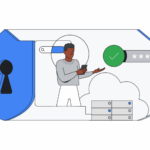Google has boldly taken a major step forward in the realm of cyber-security with their latest Advanced Protection Program. Previously reliant on the Google Authenticator app, the tech behemoth has chosen to prioritize a physical Security Key in its battle against cyber threats. This bold innovation significantly alters the security landscape for high-risk users, such as journalists, political leaders, and campaign team members, who are more susceptible to coordinated hacking attempts.
Announced through an official blog post earlier this week, Google shared exciting insights on this game-changing approach to security. The post noted, “To provide the strongest defense against phishing, Advanced Protection goes beyond traditional 2-Step Verification. Users will now require a password in conjunction with a physical Security Key to log into their accounts.”
In addition to this, Google disclosed an important detail that users should be aware of; the traditional authentication factors, which included SMS codes or those generated by the Google Authenticator app, will become ineffective. This means the reliance on physical Security Keys essentially nullifies all other forms of user authentication.
The new advanced program not only offers an additional layer of protection through the physical “Security Key”, but it also restricts third-party apps from accessing sensitive user information through emails or Google Drive. For security-conscious users, this added feature will ensure their critical data remains shielded from possible breaches.
Google also mentioned that third-party apps asking for access to email or Google Drive will see their requests declined. Optimized user security can, however, be found with the Gmail app or Inbox by Gmail. Likewise, access to Gmail or Google Photos will necessitate the use of Google Chrome.
This security upgrade spells a change for Apple device users. Apps for mail, calendar, and contacts can no longer utilize the advanced security keys nor access Google data. The solution, however, lies in using Google’s native applications like Gmail, Calendar or Google Photos that can be downloaded on iOS devices, ensuring continuity in data protection.
A crucial point that Google emphasized is the risk associated with losing access to your account and both of your Security Keys. In such a case, the additional verification requirements set in place by Google will mean a few days’ delay before you regain account access.
The Advanced Protection Program makes it significantly tougher for hackers to gain unauthorized access to a user’s account. By introducing an additional step of physical verification, Google has effectively deterred hacking attempts that often rely on impersonation and falsely reporting account lockouts.
With this advanced program, Google once again proves its dedication to user safety by implementing robust measures against fraudulent account access. This is a commendable step in safeguarding and securing the digital world for users across the globe.
Discover more from TechBooky
Subscribe to get the latest posts sent to your email.







